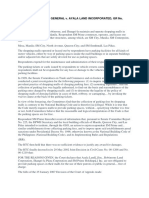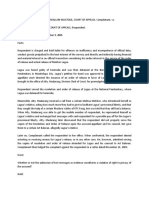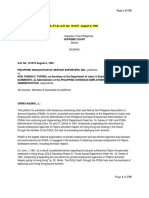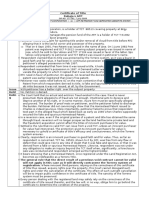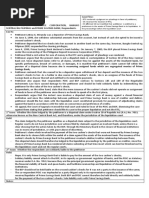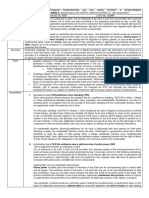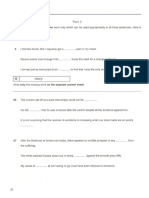Philippine National Bank v. San Miguel Corporation
Philippine National Bank v. San Miguel Corporation
Uploaded by
RJ NuñezCopyright:
Available Formats
Philippine National Bank v. San Miguel Corporation
Philippine National Bank v. San Miguel Corporation
Uploaded by
RJ NuñezCopyright
Available Formats
Share this document
Did you find this document useful?
Is this content inappropriate?
Copyright:
Available Formats
Philippine National Bank v. San Miguel Corporation
Philippine National Bank v. San Miguel Corporation
Uploaded by
RJ NuñezCopyright:
Available Formats
PHILIPPINE NATIONAL BANK, petitioner vs.
SAN MIGUEL CORPORATION, respondent
Peralta, J. January 15, 2014 G.R. No. 186063
Doctrine [doctrine] What is a letter of credit; independence principle
Summary Goroza, a dealer of SMC beers, failed to pay his credit purchases with SMC. Since the credit agreement with SMC included a
L/C arrangement, PNB, as the issuer of the L/C, was also made a party to the case. When the trial court ruled in favor of SMC
against Goroza, it also ruled that it had not yet dealt with the liability of PNB so trial still ensued as to PNB. The latter argued
that it should be deemed as freed from liability since Goroza was held to be solely liable. SC ruled for SMC, noting that the
obligation of the bank under the L/C is separate and distinct from the underlying obligation of the dealer.
Facts Exclusive dealership agreement: SMC entered into such Agreement with Rodolfo R. Goroza, who was given the
right to trade, deal, market or otherwise sell its various beer products.
Credit arrangement; letter of credit: Goroza obtained a credit line with SMC, with one of the requirements a L/C,
which obtained (P2,000,000) with PNB. PNB was to release the proceeds of Goroza's credit line to SMC upon
presentation of the invoices and official receipts of Goroza's purchases of SMC beer products to PNB Butuan Branch.
Additional credit line: Goroza obtained a one year revolving credit line not exceeding P2,400,000. It increased his
total credit line to P4,400,000. While Goroza was initially able to pay his credit purchases with SMC, sometime in
January 1998, Goroza started to become delinquent with his accounts.
Failure to pay; complaint: Demands to pay P3,722,440.88 were made by SMC against Goroza and PNB, but neither
of them paid. SMC filed a collection suit against PNB and Goroza with RTC Butuan.
Goroza portion of the case: SMC presented evidence ex parte against Goroza, who was declared in default for
failing to file an answer to the complaint. RTC ruled in favor of SMC, ordering him to pay P3.7M. Goroza filed a Notice
of Appeal while SMC filed an MR. RTC issued an order to have the exhibits and transcript of stenographic notes
reproduced in light of Goroza’s appeal and the on-going trial with respect to PNB.
PNB portion: PNB filed an Urgent Motion to Terminate Proceedings on the ground that a decision was already
rendered by the court finding Goroza solely liable. RTC denied the Motion.
RTC judgment: RTC ruled that it inadvertently omitted a phrase in its earlier decision to the effect that the ruling
against Goroza was without prejudice to the decision to be made against PNB, which was not declared in default.
RTC denied PNB’s MR. CA denied the petition for certiorari filed against the RTC and the MR, hence this petition.
Issues/Ratio
I. W/N RTC erred in rendering the judgment against PNB despite the perfection of Goroza’s appeal (NO)
It was the intention of the RTC to conduct separate proceedings to determine the respective liabilities of Goroza and
PNB and to render several and separate judgments. The procedure it adopted is allowed under Sec. 4, Rule 36,
which provides that "in an action against several defendants, the court may…render judgment against one or more of
them, leaving the action to proceed against the others." Goroza’s appeal assailing the judgment of the RTC finding
him liable, will not prevent the continuation of the ongoing trial between SMC and PNB. RTC retains jurisdiction
insofar as PNB is concerned, because the appeal made by Goroza was only with respect to his own liability.
II. W/N PNB is liable under the letter of credit it issued (TO BE DETERMINED)
[doctrine] By definition, a letter of credit is a written instrument whereby the writer requests or authorizes the
addressee to pay money or deliver goods to a third person and assumes responsibility for payment of debt therefor to
the addressee. A L/C, if carried through to completion, ends up as a binding contract between the issuing and
honoring banks without any regard or relation to the underlying contract or disputes between the parties thereto.
The engagement of the issuing bank is to pay the seller or beneficiary of the credit once the draft and the required
documents are presented to it. The independence principle assures the seller or the beneficiary of prompt payment
independent of any breach of the main contract and precludes the issuing bank from determining whether the main
contract is actually accomplished or not. Banks assume no liability or responsibility for any document, conditions
stipulated in the documents, liability or responsibility for quantity or quality of the goods, acts or omissions of the
consignor, the carriers, or the insurers of the goods, or any other person whomsoever.
[as applied] In a L/C transaction, as in this case, where the credit is stipulated as irrevocable, there is a definite
undertaking by the issuing bank to pay the beneficiary provided that the stipulated documents are presented and the
conditions of the credit are complied with. The independence principle liberates the issuing bank from the duty of
ascertaining compliance by the parties in the main contract. The obligation under the L/C is independent of the
related and originating contract. In brief, the L/C is separate and distinct from the underlying transaction.
In other words, PNB cannot evade responsibility on the sole ground that the RTC found Goroza liable to pay SMC. It
did not rule that Goroza was solely liable. PNB's liability, if any, under the L/C has yet to be determined.
Holding Petition DENIED. CA AFFIRMED.
Note: after the issuing bank pays the honoring bank, the honoring
bank gives to it the necessary docs, to give to the buyer/importer
when the latter pays the issuing bank
You might also like
- Facts:: Office of Solicitor General V. Ayala Land Incorporated, GR No. 177056, 2009-09-18No ratings yetFacts:: Office of Solicitor General V. Ayala Land Incorporated, GR No. 177056, 2009-09-183 pages
- Midway Maritime and Technological Foundation vs. CastroNo ratings yetMidway Maritime and Technological Foundation vs. Castro5 pages
- Case Digest, JD2A, Traders Royal Bank Vs CA, 1997, JamerNo ratings yetCase Digest, JD2A, Traders Royal Bank Vs CA, 1997, Jamer2 pages
- Cruz Suzanne P. Case Digest No. 1 People VS TingNo ratings yetCruz Suzanne P. Case Digest No. 1 People VS Ting1 page
- Heirs of Arturo Reyes v. Socco-Beltran, 572 SCRA 211 (2008)No ratings yetHeirs of Arturo Reyes v. Socco-Beltran, 572 SCRA 211 (2008)2 pages
- Bitanga v. Pyramid, G.R. 173526, 28 August 2008No ratings yetBitanga v. Pyramid, G.R. 173526, 28 August 20081 page
- The Negotiable Instruments Law Codal Provisions OnlyNo ratings yetThe Negotiable Instruments Law Codal Provisions Only4 pages
- PEOPLE OF THE PHILIPPINES vs. Hon. Judge Nitafan G.R. Nos. 81559-60, 1992 Ponente: Gutierrez, JR., J FactsNo ratings yetPEOPLE OF THE PHILIPPINES vs. Hon. Judge Nitafan G.R. Nos. 81559-60, 1992 Ponente: Gutierrez, JR., J Facts1 page
- LUIS S. WONG v. CA, GR No. 117857, 2001-02-02No ratings yetLUIS S. WONG v. CA, GR No. 117857, 2001-02-022 pages
- Saura Import & Export Co., Inc V. Development Bank of The PhilippinesNo ratings yetSaura Import & Export Co., Inc V. Development Bank of The Philippines2 pages
- DURBAN APARTMENTSvs - PIONEER INSURANCE ANDSURETYCORPORATIONG.R. No. 179419 (Com Law)No ratings yetDURBAN APARTMENTSvs - PIONEER INSURANCE ANDSURETYCORPORATIONG.R. No. 179419 (Com Law)1 page
- Bataan Cigar & Cigarette CompanyBataan Cigar and Cigarette Factory, Inc. vs. Court of Appeals 230 SCRA 643No ratings yetBataan Cigar & Cigarette CompanyBataan Cigar and Cigarette Factory, Inc. vs. Court of Appeals 230 SCRA 6432 pages
- Bank of The Philippine Islands vs. Spouses Reynaldo and Victoria Royeca G.R. No. 176664, July 21, 2008 559 SCRA 207 FactsNo ratings yetBank of The Philippine Islands vs. Spouses Reynaldo and Victoria Royeca G.R. No. 176664, July 21, 2008 559 SCRA 207 Facts9 pages
- Transfield Philippines Vs Luzon Hydro Electric CorpNo ratings yetTransfield Philippines Vs Luzon Hydro Electric Corp5 pages
- Dionisia L. Reyes, Petitioner, vs. Ricardo L. Reyes, Lazaro L. Reyes, Narciso L. Reyes and Marcelo L. Reyes, Respondents.No ratings yetDionisia L. Reyes, Petitioner, vs. Ricardo L. Reyes, Lazaro L. Reyes, Narciso L. Reyes and Marcelo L. Reyes, Respondents.3 pages
- Guingona vs. City Fiscal of Manila, 4 April 1984No ratings yetGuingona vs. City Fiscal of Manila, 4 April 19841 page
- Hur Tin Yang vs. People of The PhilippinesNo ratings yetHur Tin Yang vs. People of The Philippines2 pages
- United BF Homeowners' Asso., Inc., Et. Al. vs. The City Mayor of ParanaqueNo ratings yetUnited BF Homeowners' Asso., Inc., Et. Al. vs. The City Mayor of Paranaque2 pages
- Mabuhay Holdings Corporation v. Sembcorp Logistics Limited100% (1)Mabuhay Holdings Corporation v. Sembcorp Logistics Limited24 pages
- Culion Ice, Fish & Electric Co. Inc. v. Philippine Motors CorporationNo ratings yetCulion Ice, Fish & Electric Co. Inc. v. Philippine Motors Corporation2 pages
- Malaysia Company Profile (Sample) : Type of No ofNo ratings yetMalaysia Company Profile (Sample) : Type of No of1 page
- SmartCAT-10720 Questions With SolutionsNo ratings yetSmartCAT-10720 Questions With Solutions104 pages
- Revision of Rates and Guidelines For Reimbursement of Expenses On Purchase of Hearing AidsNo ratings yetRevision of Rates and Guidelines For Reimbursement of Expenses On Purchase of Hearing Aids2 pages
- Digest of Mobil Phils Vs City Treasurer of MakatiNo ratings yetDigest of Mobil Phils Vs City Treasurer of Makati2 pages
- Short Volatility Positioning A Cause For Concern BarclaysNo ratings yetShort Volatility Positioning A Cause For Concern Barclays14 pages
- Samsung Understanding FS Tutorial QuestionsNo ratings yetSamsung Understanding FS Tutorial Questions5 pages
- Practice Tests CPE 1-Trang-20-23,46-49,72-75,98-101,124-127,150-153No ratings yetPractice Tests CPE 1-Trang-20-23,46-49,72-75,98-101,124-127,150-15324 pages
- Annual Return of A Company (Other Than A Company Limited by Guarantee)No ratings yetAnnual Return of A Company (Other Than A Company Limited by Guarantee)5 pages
- Strategic Management and Business Policy Globalization Innovation and Sustainability 14th Edition Wheelen Solutions Manual100% (25)Strategic Management and Business Policy Globalization Innovation and Sustainability 14th Edition Wheelen Solutions Manual20 pages
- Laguna Lakeshore Expressway Dike ProjectNo ratings yetLaguna Lakeshore Expressway Dike Project1 page
- Account Report PB Appropriation Accounts 2018 19 06045b8871d48a7 75101259No ratings yetAccount Report PB Appropriation Accounts 2018 19 06045b8871d48a7 75101259337 pages
- The Aforesaid Noticees Are Hereinafter Referred To by Their Respective Name / Noticee Number and Collectively Referred To As "Noticees", Unless The Context Specifies OtherwiseNo ratings yetThe Aforesaid Noticees Are Hereinafter Referred To by Their Respective Name / Noticee Number and Collectively Referred To As "Noticees", Unless The Context Specifies Otherwise41 pages




